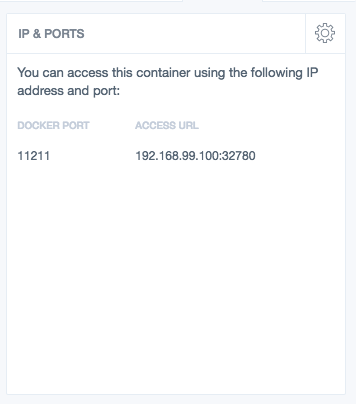Spring Memcached аннотации не кэшируются
Я пытаюсь заставить Memcache работать весной.
Я установил локальный сервер Memcached, используя Docker и Kitematic:
Я могу получить доступ к серверу Memcached, используя telnet: telnet 192.168.99.100 32780 а потом беги stats или же stats items (который только распечатывает END если кеш пуст);
мой pom.xml:
<dependency>
<groupId>com.google.code.simple-spring-memcached</groupId>
<artifactId>simple-spring-memcached</artifactId>
<version>3.6.0</version>
</dependency>
<dependency>
<groupId>com.google.code.simple-spring-memcached</groupId>
<artifactId>spring-cache</artifactId>
<version>3.6.0</version>
</dependency>
<dependency>
<groupId>com.google.code.simple-spring-memcached</groupId>
<artifactId>xmemcached-provider</artifactId>
<version>3.6.0</version>
</dependency>
В моем applicationContext.xml У меня есть следующее:
<?xml version="1.0" encoding="UTF-8" standalone="no"?>
<beans
xmlns="http://www.springframework.org/schema/beans"
xmlns:context="http://www.springframework.org/schema/context"
xmlns:tx="http://www.springframework.org/schema/tx"
xmlns:xsi="http://www.w3.org/2001/XMLSchema-instance"
xmlns:rabbit="http://www.springframework.org/schema/rabbit"
xmlns:task="http://www.springframework.org/schema/task"
xsi:schemaLocation="http://www.springframework.org/schema/beans http://www.springframework.org/schema/beans/spring-beans-3.2.xsd
http://www.springframework.org/schema/context http://www.springframework.org/schema/context/spring-context-3.2.xsd
http://www.springframework.org/schema/tx http://www.springframework.org/schema/tx/spring-tx-3.2.xsd
http://www.springframework.org/schema/rabbit http://www.springframework.org/schema/rabbit/spring-rabbit.xsd
http://www.springframework.org/schema/task http://www.springframework.org/schema/task/spring-task-3.2.xsd">
<context:property-placeholder location="classpath*:META-INF/spring/*.properties"/>
...
<import resource="cacheContext.xml" />
...
В cacheContext.xml мой конфиг выглядит следующим образом:
<?xml version="1.0" encoding="UTF-8"?>
<beans xmlns="http://www.springframework.org/schema/beans" xmlns:xsi="http://www.w3.org/2001/XMLSchema-instance"
xmlns:context="http://www.springframework.org/schema/context"
xmlns:cache="http://www.springframework.org/schema/cache"
xmlns:aop="http://www.springframework.org/schema/aop"
xsi:schemaLocation="http://www.springframework.org/schema/cache http://www.springframework.org/schema/cache/spring-cache.xsd
http://www.springframework.org/schema/aop http://www.springframework.org/schema/aop/spring-aop-3.2.xsd
http://www.springframework.org/schema/beans
http://www.springframework.org/schema/beans/spring-beans-3.2.xsd
http://www.springframework.org/schema/context
http://www.springframework.org/schema/context/spring-context-3.2.xsd">
<aop:aspectj-autoproxy/>
<cache:annotation-driven/>
<context:component-scan base-package="com.google.code.ssm"/>
<context:component-scan base-package="com.mycee.application"/>
<bean id="cacheBase" class="com.google.code.ssm.aop.CacheBase"/>
<bean id="readThroughSingleCache" class="com.google.code.ssm.aop.ReadThroughSingleCacheAdvice">
<property name="cacheBase" ref="cacheBase"/>
</bean>
<bean id="readThroughMultiCache" class="com.google.code.ssm.aop.ReadThroughMultiCacheAdvice">
<property name="cacheBase" ref="cacheBase"/>
</bean>
<bean id="readThroughAssignCache" class="com.google.code.ssm.aop.ReadThroughAssignCacheAdvice">
<property name="cacheBase" ref="cacheBase"/>
</bean>
<bean id="updateSingleCache" class="com.google.code.ssm.aop.UpdateSingleCacheAdvice">
<property name="cacheBase" ref="cacheBase"/>
</bean>
<bean id="updateMultiCache" class="com.google.code.ssm.aop.UpdateMultiCacheAdvice">
<property name="cacheBase" ref="cacheBase"/>
</bean>
<bean id="updateAssignCache" class="com.google.code.ssm.aop.UpdateAssignCacheAdvice">
<property name="cacheBase" ref="cacheBase"/>
</bean>
<bean id="invalidateSingleCache" class="com.google.code.ssm.aop.InvalidateSingleCacheAdvice">
<property name="cacheBase" ref="cacheBase"/>
</bean>
<bean id="invalidateMultiCache" class="com.google.code.ssm.aop.InvalidateMultiCacheAdvice">
<property name="cacheBase" ref="cacheBase"/>
</bean>
<bean id="invalidateAssignCache" class="com.google.code.ssm.aop.InvalidateAssignCacheAdvice">
<property name="cacheBase" ref="cacheBase"/>
</bean>
<bean id="incrementCounterInCache" class="com.google.code.ssm.aop.counter.IncrementCounterInCacheAdvice">
<property name="cacheBase" ref="cacheBase"/>
</bean>
<bean id="decrementCounterInCache" class="com.google.code.ssm.aop.counter.DecrementCounterInCacheAdvice">
<property name="cacheBase" ref="cacheBase"/>
</bean>
<bean id="readCounterFromCache" class="com.google.code.ssm.aop.counter.ReadCounterFromCacheAdvice">
<property name="cacheBase" ref="cacheBase"/>
</bean>
<bean id="updateCounterInCache" class="com.google.code.ssm.aop.counter.UpdateCounterInCacheAdvice">
<property name="cacheBase" ref="cacheBase"/>
</bean>
<bean name="cacheManager" class="com.google.code.ssm.spring.SSMCacheManager">
<property name="caches">
<set>
<bean class="com.google.code.ssm.spring.SSMCache">
<constructor-arg name="cache" index="0" ref="defaultCache"/>
<constructor-arg name="expiration" index="1" value="300"/>
<constructor-arg name="allowClear" index="2" value="false"/>
</bean>
</set>
</property>
</bean>
<bean name="defaultCache" class="com.google.code.ssm.CacheFactory" depends-on="cacheBase">
<property name="cacheName" value="defaultCache"/>
<property name="cacheClientFactory">
<bean class="com.google.code.ssm.providers.xmemcached.MemcacheClientFactoryImpl"/>
</property>
<property name="addressProvider">
<bean class="com.google.code.ssm.config.DefaultAddressProvider">
<property name="address" value="localhost:11211"/>
</bean>
</property>
<property name="configuration">
<bean class="com.google.code.ssm.providers.CacheConfiguration">
<property name="consistentHashing" value="true"/>
</bean>
</property>
</bean>
</beans>
Я создал три разных метода, каждый из которых использует разные механизмы кэширования:
@Component("cacheEndpoint")
public class CacheClass {
@Autowired
SSMCacheManager cache;
public String getDateTime1(String anything) {
SSMCache c = cache.getCache("defaultCache");
String s = c.get(anything, String.class);
if (s != null) {
return s;
}
Date d = new Date();
String response = d.toString() + " - " + d.getTime();
c.put(anything, response);
return response;
}
@Cacheable("defaultCache")
public String getDateTime2(String anything) {
Date d = new Date();
String response = d.toString() + " - " + d.getTime();
return response;
}
@ReadThroughSingleCache(namespace = "defaultCache", expiration = 15000)
public String getDateTime3(String anything) {
Date d = new Date();
String response = d.toString() + " - " + d.getTime();
return response;
}
}
Для доступа к нему я делаю:
@Autowired
CacheClass c;
...
// caches perfectly
c.getDateTime1("test");
// doesn't do any caching
c.getDateTime2("test");
// doesn't do any caching
c.getDateTime3("test");
После размещения исключений во время выполнения в getDateTime2 а также getDateTime3Было установлено, что перехватчики не вызываются.
Любая идея, что может быть причиной @Cachable а также @ReadThroughSingleCache не делает их перехват магии?
Обновление на основе ответа Матяжа Печана:
Интерфейс CacheClass:
public interface CacheClass {
public String getDateTime1(String anything);
public String getDateTime2(String anything);
public String getDateTime3(String anything);
}
Реализация CacheClass:
@Component("cacheEndpoint")
public class CacheClassImpl implements CacheClass {
@Autowired
SSMCacheManager cache;
public String getDateTime1(String anything) {
SSMCache c = cache.getCache("defaultCache");
String s = c.get(anything, String.class);
if (s != null) {
return s;
}
Date d = new Date();
String response = d.toString() + " - " + d.getTime();
c.put(anything, response);
return response;
}
@Cacheable("defaultCache")
public String getDateTime2(String anything) {
Date d = new Date();
String response = d.toString() + " - " + d.getTime();
return response;
}
@ReadThroughSingleCache(namespace = "defaultCache", expiration = 15000)
public String getDateTime3(String anything) {
Date d = new Date();
String response = d.toString() + " - " + d.getTime();
return response;
}
}
Конечная точка SOAP, где я тестирую кеш:
@Endpoint
public class PingEndpoint {
@Autowired
CacheClass c;
@ResponsePayload
@PayloadRoot(localPart = "PingRequest", namespace = "http://www.mycee.com/Application")
public PingResponse doPing(@RequestPayload PingRequest request) {
// caches perfectly
System.out.println(c.getDateTime1("test"));
// doesn't do any caching
System.out.println(c.getDateTime2("test"));
// doesn't do any caching
System.out.println(c.getDateTime3("test"));
}
}
cacheContext.xml:
<?xml version="1.0" encoding="UTF-8"?>
<beans xmlns="http://www.springframework.org/schema/beans" xmlns:xsi="http://www.w3.org/2001/XMLSchema-instance"
xmlns:context="http://www.springframework.org/schema/context"
xmlns:cache="http://www.springframework.org/schema/cache"
xmlns:aop="http://www.springframework.org/schema/aop"
xsi:schemaLocation="http://www.springframework.org/schema/cache http://www.springframework.org/schema/cache/spring-cache.xsd
http://www.springframework.org/schema/aop http://www.springframework.org/schema/aop/spring-aop-3.2.xsd
http://www.springframework.org/schema/beans
http://www.springframework.org/schema/beans/spring-beans-3.2.xsd
http://www.springframework.org/schema/context
http://www.springframework.org/schema/context/spring-context-3.2.xsd">
<aop:aspectj-autoproxy proxy-target-class="true"/>
<cache:annotation-driven/>
...
2 ответа
В SSM 3.6.0 произошла ошибка, пожалуйста, вернитесь к версии 3.5.0, чтобы решить проблему, или попробуйте добавить
depends-on="cacheBase"
к определению bean-компонента defaultCache.
Обновление 1
Самостоятельные призывы не работают. Вызов не будет перехвачен, и результат не будет кэширован, если вызов выполняется через этот объект. Убедитесь, что метод, определенный в бине, вызывается из другого бина Spring.
Обновление 2
Для SSM метод должен быть аннотирован, как показано ниже:
@ReadThroughSingleCache(namespace = "defaultCache", expiration = 15000)
public String getDateTime3(@ParameterValueKeyProvider String anything) {
...
}
До сих пор перехватчики по некоторым причинам не срабатывают.
Механизмы проксирования пружин различаются в зависимости от используемой реализации.
По умолчанию используется AspectJ, для которого требуются интерфейсы (proxy-by-interface), и эти интерфейсы будут реализованы фактическим прокси, обернутым вокруг вашего компонента. Поскольку ваш бин является только классом и не имеет интерфейса, он не проксируется с AspectJ.
Есть два возможных решения:
- Реализуйте интерфейс для CacheClass и используйте этот интерфейс при подключении к другим bean-компонентам
Используйте прокси CGLib (вам нужно будет добавить зависимость времени выполнения от CGLib) и добавить proxy-target-class в ваш элемент aspectj-proxy:
<aop:aspectj-autoproxy proxy-target-class="true"/>
